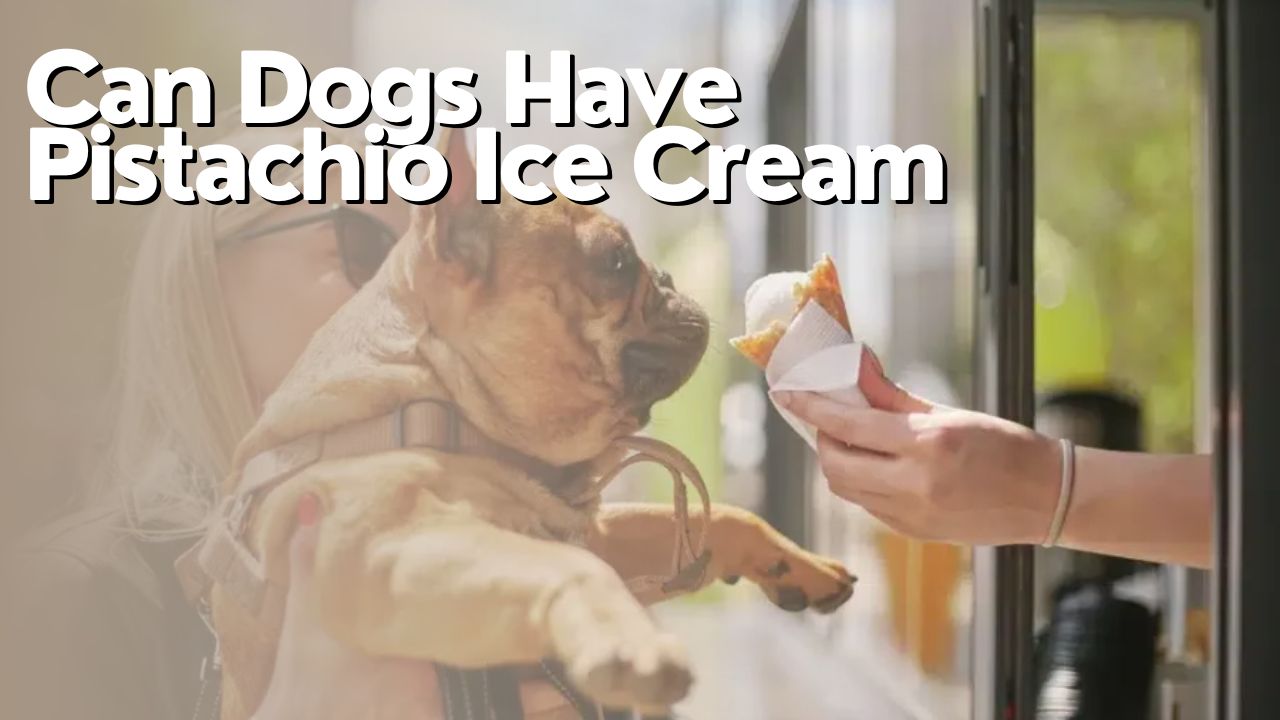Hey there! So, have you ever wondered if it’s safe to give your furry friend a taste of pistachio ice cream? Well, I’ve got some important information for you.
In this article, we’ll be diving into the potential risks of giving dogs pistachio ice cream and exploring safe alternatives that they can enjoy instead.
Now, I know how tempting it can be to share a sweet treat with your pup, but it’s crucial to consider their well-being first. Dogs have different digestive systems than humans, and certain ingredients can be harmful to them. We’ll be discussing some specific health conditions that may make pistachio ice cream an even bigger no-no.
Additionally, we’ll be covering the signs of pistachio ice cream toxicity in dogs, so you can be aware of any potential dangers.
Ultimately, it’s important to prioritize your dog’s health and happiness. So, let’s jump in and find out if dogs can have pistachio ice cream or if it’s best to stick to some safer alternatives.
The Potential Risks of Pistachio Ice Cream for Dogs
You shouldn’t give your dog pistachio ice cream because it can potentially have harmful effects on their health. While pistachios themselves are not toxic to dogs, the ice cream can contain ingredients that are harmful to them.
One major concern is the high fat content in pistachio ice cream. Dogs have a difficult time digesting large amounts of fat, which can lead to pancreatitis, a painful inflammation of the pancreas. Symptoms of pancreatitis include vomiting, diarrhea, loss of appetite, and abdominal pain.
Additionally, pistachio ice cream often contains artificial sweeteners like xylitol, which is extremely toxic to dogs. Xylitol can cause a rapid release of insulin, leading to dangerously low blood sugar levels, liver damage, and even death. It’s important to remember that even a small amount of xylitol can be fatal to dogs.
Furthermore, some dogs may also be allergic to pistachios, and consuming pistachio ice cream could trigger an allergic reaction. Signs of an allergic reaction in dogs include itching, redness, swelling, hives, and difficulty breathing.
To keep your furry friend safe and healthy, it’s best to avoid giving them pistachio ice cream altogether. Stick to dog-friendly treats and consult with your veterinarian if you have any concerns about what foods are safe for your dog to consume.

Safe Alternatives for Dogs to Enjoy
Indulging in a delightful treat together can bring immense joy to your furry friend’s day. While pistachio ice cream may not be a safe option for dogs, there are plenty of alternatives that they can enjoy without any potential risks.
One such alternative is making homemade frozen treats using dog-friendly ingredients. I love making frozen yogurt treats for my dog. I simply mix plain yogurt with some mashed bananas or pureed pumpkin, and then freeze it in small silicone molds. Not only does my dog absolutely love these treats, but they also provide some health benefits. Yogurt is packed with probiotics, which can help improve digestion and support a healthy immune system.
Another safe alternative is frozen fruits. Dogs can enjoy small pieces of frozen watermelon, strawberries, or blueberries. These fruits are not only refreshing but also provide essential vitamins and antioxidants. Just be sure to remove any seeds or pits before giving them to your dog.
So, while pistachio ice cream may not be suitable for dogs, there are plenty of safe and enjoyable alternatives that can make their day even more special.
Considerations for Dogs with Specific Health Conditions
When considering your furry friend’s specific health conditions, it’s important to explore safe alternatives and treats that cater to their individual needs. Dogs, just like humans, can have various health conditions that require special attention and care.
When it comes to giving treats, such as ice cream, to dogs with specific health conditions, it’s crucial to keep their well-being in mind.
If your dog has a sensitive stomach or is prone to digestive issues, it’s best to avoid giving them pistachio ice cream or any other dairy-based treats. Dairy can be difficult for dogs to digest and may cause stomach upset or diarrhea. Instead, opt for alternatives that are gentle on their stomach, such as frozen yogurt made specifically for dogs or even homemade frozen treats using dog-friendly ingredients like pureed fruits or vegetables.
For dogs with allergies or skin sensitivities, it’s important to avoid treats that contain ingredients they may be allergic to. Pistachios, in particular, can be a common allergen for dogs. Instead, look for hypoallergenic ice cream options or treats that are free from common allergens like grains, dairy, or artificial additives.
Lastly, if your dog has any underlying health conditions or is on medication, it’s essential to consult with your veterinarian before introducing any new treats into their diet. They can provide guidance on what treats are safe and appropriate for your dog’s specific health needs.
Overall, when it comes to dogs with specific health conditions, it’s crucial to choose treats that are safe, gentle on their stomach, and free from any potential allergens. By considering their individual needs, you can ensure that your furry friend can still enjoy delicious treats while maintaining their health and well-being.
Signs of Pistachio Ice Cream Toxicity in Dogs
Be aware of the potential dangers of feeding your furry friend pistachio ice cream by recognizing the signs of toxicity in your beloved canine companion. While it may be tempting to share a sweet treat with your dog, pistachio ice cream can be harmful to their health. Dogs have different digestive systems than humans, and certain ingredients in pistachio ice cream can cause adverse reactions in them.
If your dog consumes pistachio ice cream, watch out for these signs of toxicity:
- Vomiting: If your dog starts vomiting after eating pistachio ice cream, it could be a sign of an upset stomach or even a more serious reaction.
- Diarrhea: Excessive consumption of pistachio ice cream can lead to diarrhea in dogs. Keep an eye on their bowel movements for any changes.
- Lethargy: If your normally active dog becomes unusually tired or sluggish after eating pistachio ice cream, it could indicate a negative reaction.
- Abdominal pain: Dogs may experience discomfort or pain in their abdomen as a result of pistachio ice cream consumption.
- Allergic reactions: Some dogs may be allergic to certain ingredients in pistachio ice cream, leading to symptoms such as itching, swelling, or difficulty breathing.
Remember, it’s always best to consult with your veterinarian before introducing any new food to your dog’s diet. Their expertise will help ensure your furry friend stays happy and healthy.

Conclusion: Prioritizing Your Dog’s Well-being
Make sure you prioritize your furry friend’s well-being by consulting with your veterinarian before introducing any new treats into their diet.
When it comes to pistachio ice cream, it’s important to understand the potential risks and signs of toxicity in dogs. Pistachio ice cream contains ingredients like pistachio nuts, sugar, and dairy, which can be harmful to dogs in large quantities.
Some common signs of pistachio ice cream toxicity in dogs include vomiting, diarrhea, abdominal pain, lethargy, and even pancreatitis. These symptoms can range from mild to severe, depending on the amount of pistachio ice cream consumed and the sensitivity of your dog’s digestive system.
It’s crucial to recognize these signs and take immediate action by contacting your veterinarian if you suspect your dog has ingested pistachio ice cream or any other potentially toxic substances. Your veterinarian is the best source of advice when it comes to your dog’s health and dietary needs. They can provide you with personalized recommendations and guide you on making informed decisions to ensure your dog’s well-being.
So, always consult with your veterinarian first before giving your dog any new treats, including pistachio ice cream.
Frequently Asked Questions
Can dogs have other flavors of ice cream besides pistachio?
Yes, dogs can have other flavors of ice cream besides pistachio. However, it’s important to choose flavors that are safe for them, like vanilla or peanut butter, and to avoid ones with chocolate or artificial sweeteners.
Is it safe to give my dog a small taste of pistachio ice cream occasionally?
It is generally safe to give my dog a small taste of pistachio ice cream occasionally. However, it is important to remember that too much can lead to upset stomach, diarrhea, or an allergic reaction.
Are there any natural remedies or home remedies for dogs who have consumed pistachio ice cream?
If your dog has consumed pistachio ice cream, there are a few natural remedies you can try. You can give them plain yogurt or pumpkin puree to soothe their stomach.
Can dogs have pistachio nuts without the ice cream?
Yes, dogs can have pistachio nuts without the ice cream. However, it’s important to remember that moderation is key. Too many pistachios can cause digestive issues or even be a choking hazard for dogs.
Are there any special precautions to take if my dog has a nut allergy?
If my dog has a nut allergy, I need to take special precautions. This may include avoiding any exposure to nuts and carefully reading ingredient labels to ensure their safety.
Conclusion
In conclusion, I must emphasize the importance of prioritizing your dog’s well-being when it comes to their diet.
While pistachio ice cream may be tempting to share with your furry friend, it is best to avoid it due to potential risks and health concerns.
Instead, opt for safe alternatives that are specifically made for dogs.
Always be mindful of any specific health conditions your dog may have, and watch out for signs of pistachio ice cream toxicity.
Your dog’s health and happiness should always come first.


